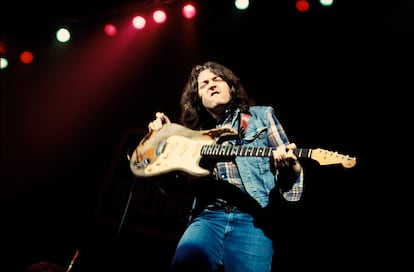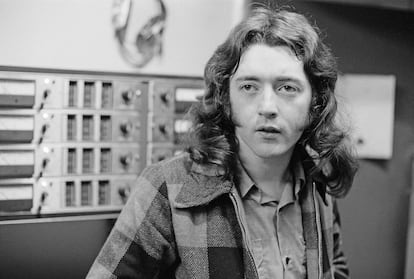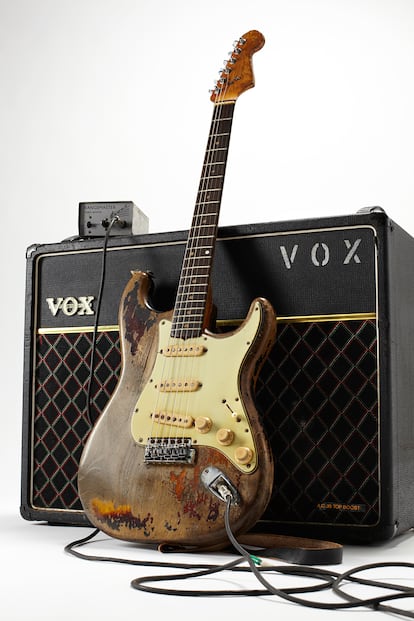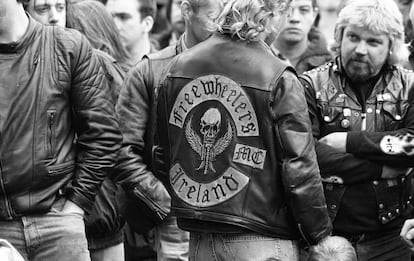Rory Gallagher: The greatest guitarist you never heard of
The late Irish musician, though unfairly overlooked amongst rock’s best guitarists, now receives a well-deserved tribute


Isle of Wight Festival, August 1970. Guitarist Rory Gallagher takes the stage on opening night with his band, Taste. The Irish musician captivates both audiences and experts alike with his impressive power, talent and emotional intensity. Two days later, Jimi Hendrix, already a global superstar, gives a typically rousing performance at the festival. At the press conference, a reporter asked, “How does it feel to be the best guitarist in the world?” Hendrix shrugged and replied, “I don’t know, ask Rory Gallagher.”
Rock historians generally accept this anecdote as true, even though no one has found any evidence to support it. Nevertheless, it could perfectly well be a true story. Rory Gallagher, who died in 1995 and esteemed for his musical ability and integrity, was allergic to celebrity and preferred to remain mysterious and aloof. “Supposedly Hendrix said this to Rolling Stone magazine, but I couldn’t find any evidence of it. But hey, it’s a pretty cool quote, isn’t it?” said Daniel Gallagher, Rory’s nephew and keeper of his uncle’s legacy. Daniel recently finished a live album, All Around Man – Live In London, pulled from two of his Rory’s shows during a 1990 tour to promote his final album.

For his entire playing career, Rory Gallagher, who liked to wear plaid flannel shirts and jeans, played a Fender Stratocaster that he bought as a teenager for £100 and paid off 15 years later. A worn-out guitar for a guy with rock-solid ethics. With his eyes closed, he sang, barely glancing at the guitar as he weaved his captivating solos. Rory immersed himself in the Chicago blues, later expanding his musical horizons to encompass folk, rock, jazz experimentation and the rich tapestry of Irish tradition. He didn’t understand music that didn’t come from the gut.
When Rolling Stone magazine published its list of the 100 best guitarists of all time in 2003, Gallagher wasn’t on it, prompting many musicians to protest. Queen guitarist Brian May, ranked at number 37, even called Rolling Stone to complain about Gallagher’s exclusion. In their revised 2015 list, Gallagher made it to number 57. Still well below what he deserved, according to May, who said, “He was a magician, you know? One of the few people back then who could make his guitar do whatever he wanted. It was pure magic. I still remember staring at that smashed Stratocaster, wondering, ‘Where is that sound coming from?’”
Argentine writer Marcelo Gobello is a Gallagher expert who wrote a book about the Irish musician. “Rory is one of the top four or five in the world, along with legends like Jimi Hendrix, Eric Clapton and Jimmy Page, who totally adored him. Clapton always saw him as a serious contender. I mean, the guy had this incredible integrity and passion, and his live performances are just incredible,” said Gobello.

Rory Gallagher was born in Ballyshannon, Ireland in 1948. When he was just eight years old, his parents recognized his innate musical talents and bought him a guitar. “I heard Muddy Waters on the radio playing slide on a Telecaster one night. The music just came to me out of the ether and changed my life,” he said in an interview that Marcelo Gobello included in his book on Gallagher.
Gallagher’s first noteworthy band was Taste, a trio like Cream and The Jimi Hendrix Experience. They released two albums — Taste (1969) and On the Boards (1970). Taste was a blues band that made room for jazz, folk and improvised jams, but they only lasted four years due to internal strife and a shady manager who pocketed much of their earnings. Lawsuits and albums released without Rory’s consent left long-lasting wounds. Despite the fans’ demands, the guitarist adamantly refused to play any Taste songs in concert for the rest of his career.
Rory’s distrust of the music industry started there, and his brother Donald, Daniel’s father, became the only person he trusted to handle his business affairs. “I didn’t know my uncle was a rock musician until I was five years old when my father took me to a Rory concert in London,” said Daniel. “When I was seven years old, my uncle bought me a guitar and taught me my first song – ‘Frère Jacques.’ When I was older and Guns N’ Roses was my favorite band, my father showed me some photos of Rory playing with Slash. I was so impressed.” Slash is another devoted Gallagher fan. “Rory didn’t sound like anyone else — he had this unique, independent sound and approach. He’s always been my hero,” wrote the Guns N’ Roses guitarist in the album’s liner notes.
Following the bitter breakup of Taste in 1971, Gallagher embarked on a solo career that showcased his virtuosity as a raw and emotional performer. His songs were not merely showcases for his guitar skills, but genuine reflections of his feelings that produced outstanding albums like Deuce (1971), Tattoo (1973) and Calling Card (1976). However, it was in live performances that Gallagher truly demonstrated his brilliance. One of his most remarkable achievements is undoubtedly the mesmerizing Irish Tour ‘74 live album, where the synergy between the musician and the audience was a show in itself. They seemed to feed off each other’s energy, igniting a tangible atmosphere that was almost visible. One of Gallaghers first concerts in Spain — Madrid 1975 — was where Spanish rocker Rosendo Mercado met his idol. “I’ve never lined up to get a concert ticket in my life. You know, except for that one time, just for Rory,” Mercado once said.

In 1974, Gallagher was approached by the Rolling Stones to replace Mick Taylor, but Rory chose to chart his own course. Deep Purple also considered him as a replacement for Ritchie Blackmore, but he declined that offer as well. “I’d like to stay free for a while because you never know when they’re going to get you,” he used to say. He met and played with many musicians to keep on learning and developing as an instrumentalist — Muddy Waters, Jerry Lee Lewis, Béla Fleck, the Dubliners and more.
Many believe that Gallagher has never received the recognition he deserves. Marcelo Gobello offers some insights into the reasons. “He never really made it big in the American market because he didn’t want to make compromises like Eric Clapton, who, you know, embraced pop in the 1980s and even wore a suit. But Rory, he stuck to his guns and stayed true to his blues-rock roots. He didn’t sellout. He was 100% pure.” Daniel Gallagher said, “Rory purposely avoided the trappings of fame. He never released singles that would have gotten him a lot of radio play, especially in the United States. He didn’t go to any of celebrity events, didn’t work with big-name producers and didn’t date actresses. He just wasn’t looking for all that publicity — he simply wanted to be known for his music.”

Gallagher didn’t play the part of the stereotypical hard-partying rocker. After concerts, he would unwind in his hotel room reading and watching movies, particularly film noir. Rory didn’t have any children or romantic partners after a devastating heartbreak in the late 1960s that inspired the emotional song from his first solo album, I Fall Apart. Rory drank alone, and alcohol took a heavy toll on his health. “During his last year, he was really sick, making it incredibly hard for him to perform on stage. And you know, without live music, it was just really tough for him to keep going,” said Gobello.
In the summer of 1995, he was admitted to a renowned London hospital for a liver transplant, a consequence of his alcohol abuse. The choice was stark: undergo the difficult procedure or face certain death. Tragically, the operation was unsuccessful and the 47-year-old Gallagher died on June 14. Today, his memory lives on in the form of a towering bronze statue in his hometown of Ballyshannon, rocking his battered but beloved Fender guitar in jeans and a plaid flannel shirt.
Sign up for our weekly newsletter to get more English-language news coverage from EL PAÍS USA Edition
Tu suscripción se está usando en otro dispositivo
¿Quieres añadir otro usuario a tu suscripción?
Si continúas leyendo en este dispositivo, no se podrá leer en el otro.
FlechaTu suscripción se está usando en otro dispositivo y solo puedes acceder a EL PAÍS desde un dispositivo a la vez.
Si quieres compartir tu cuenta, cambia tu suscripción a la modalidad Premium, así podrás añadir otro usuario. Cada uno accederá con su propia cuenta de email, lo que os permitirá personalizar vuestra experiencia en EL PAÍS.
¿Tienes una suscripción de empresa? Accede aquí para contratar más cuentas.
En el caso de no saber quién está usando tu cuenta, te recomendamos cambiar tu contraseña aquí.
Si decides continuar compartiendo tu cuenta, este mensaje se mostrará en tu dispositivo y en el de la otra persona que está usando tu cuenta de forma indefinida, afectando a tu experiencia de lectura. Puedes consultar aquí los términos y condiciones de la suscripción digital.








































